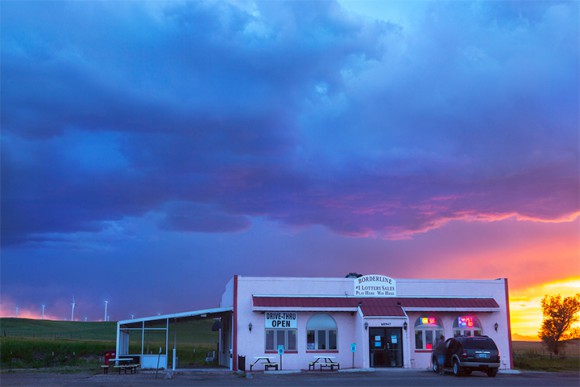Edie Bresler’s camera lens captures the spirit and heart of our nation as channeled through the neighborhood convenience store.
Like superhero comic books, jazz, and Route 66, the essence of America permeates the C-store. Sure, other countries have put their own spin on the concept, sometimes with remarkable results—Japan’s konbini come to mind—but the C-store is woven into the very fabric of the United States.
The expansive, modern palaces of convenience that have come to prominence in the last decade are certainly impressive. They’re representative of America in their own way: the drive to do something better, faster, and more stylishly than before. SSCS is fortunate to call many of them our customers.
But we’re talking about the smaller mom-and-pop stores from which the modern industry sprang, and that continue to cultivate a significant presence in many locales. Here they function not only as a commercial hub, but a social one, where locals exchange neighborhood news; clerks know their customers’ lifestyle choices, as well as their names; and a sense of community is built and sustained. This is small-scale, self-made America at its most vital. It’s easy to overlook, but it’s there. It’s everywhere.
Edie Bresler, a Boston-based photographer and leader of the photography program at Simmons College, has experienced, like few others, the spirit of America as channeled through the C-store, exploring it through the lens of her camera. Her ongoing essay, “We Sold a Winner,” is composed of images of smaller, single site, family-run operations and their owners. The unifying theme: each has sold a winning lottery ticket of significant value.
“People have all kinds of opinions regarding the lottery, but no one can deny that most communities benefit and depend on the revenue it brings, not to mention the bonus the store owner receives,” states Bresler, who has been photographing various subjects for over 35 years. “One owner even told me, ‘A store without lottery is like a bar without alcohol.’ In other words, it’s a strong draw, an essential part of the business plan.”
The stores in Bresler’s essay are striking in their individuality, yet linked by commonality—again, much like America. Their character is what drew Bresler to them in the first place. “These stores are basically Main Street America and while their personalities reflect their locales, they maintain a shared identity,” says Bresler. “I spend quality time with each owner that’s part of the project, and most everyone I talk to is warm and welcoming to a degree that is really moving. They have a lot of pride—in how their place looks, in what they have up on the walls, in how they stock their shelves with a dizzying diversity of products—and they’re delighted to share the details.”
From a conceptual standpoint, the genesis of “We Sold a Winner” occurred during the economic meltdown of 2008. Bresler lives in a community with a handful of neighborhood stores that she passed by regularly without much thought. When the financial crisis occurred, that all changed. “It seemed that everywhere I went I saw lottery tickets,” she explains. “I found that fascinating and it drew me into the stores that were selling them, where I started hanging out a bit, talking to customers and owners. That’s when it struck me that these neighborhood stores are a microcosm of American society, which made me want to examine them in more detail.”
Bresler first focused on stores in her home state of Massachusetts, but as she became more intrigued with the concept she began to follow lottery-related stories in various media. Her heightened interest led to trips in the neighboring states of New York and New Jersey first, and eventually to half the states in the U.S., an expansion of the project that was made possible, in part by grants, which Bresler estimates has funded 50–60 percent of the project so far. The balance was financed by the income Bresler earns through freelance opportunities.
“That funding percentage is pretty good for a project that functions as a social document, so I’ve been pretty fortunate,” Bresler notes. “Simmons College, where I work, is supportive as are the local arts councils. In addition, I try to be creative in seeking out revenue that can help support the project. My hope is that when this project is finished, I can put together a book; a lexicon of a very representative type of Americana. In these stories and in these places people all over the U.S. will be able to see themselves. It’s an opportunity to find common expression; to celebrate the humanity we share; to illuminate the melting pot of which we’re part.”
By spotlighting those that are often taken for granted on a daily basis, Bresler hopes to garner some respect for the Americans that work so hard to run their businesses and so diligently serve the communities they are in. “I’m in awe of so many of the people I’ve been able to interview and photograph, and frankly, without them, this project wouldn’t exist,” Bresler adds. “They’re easy to overlook, but if they ever disappeared, the impact on the neighborhoods in which they operate would be profound. Hopefully, we can call a little attention to them.”
We all know a dynamic commercial engine is shaping the industry and that there can be no turning back from consolidation, franchising, and other modern market trends. Still, look closely, and you’ll find that the bones around which even the most expansive enterprise is constructed are similar to the bones of the small independent operator, the entrepreneur that comes in all shapes and sizes and colors, the one that endures in even the most chaotic of circumstances. There’s nothing more American than that. Just ask Edie Bresler.
“We Sold a Winner” is an ongoing project. Are you an independent C-store owner that has sold a winning lottery ticket worth $1 million or more? Edie would love to hear from you. If you would like to be considered for inclusion in this living photographic essay, please direct your inquiry to ediephoto@gmail.com. If you end up being selected to participate, we’ll make sure you are profiled in depth on this blog.













Leave A Comment